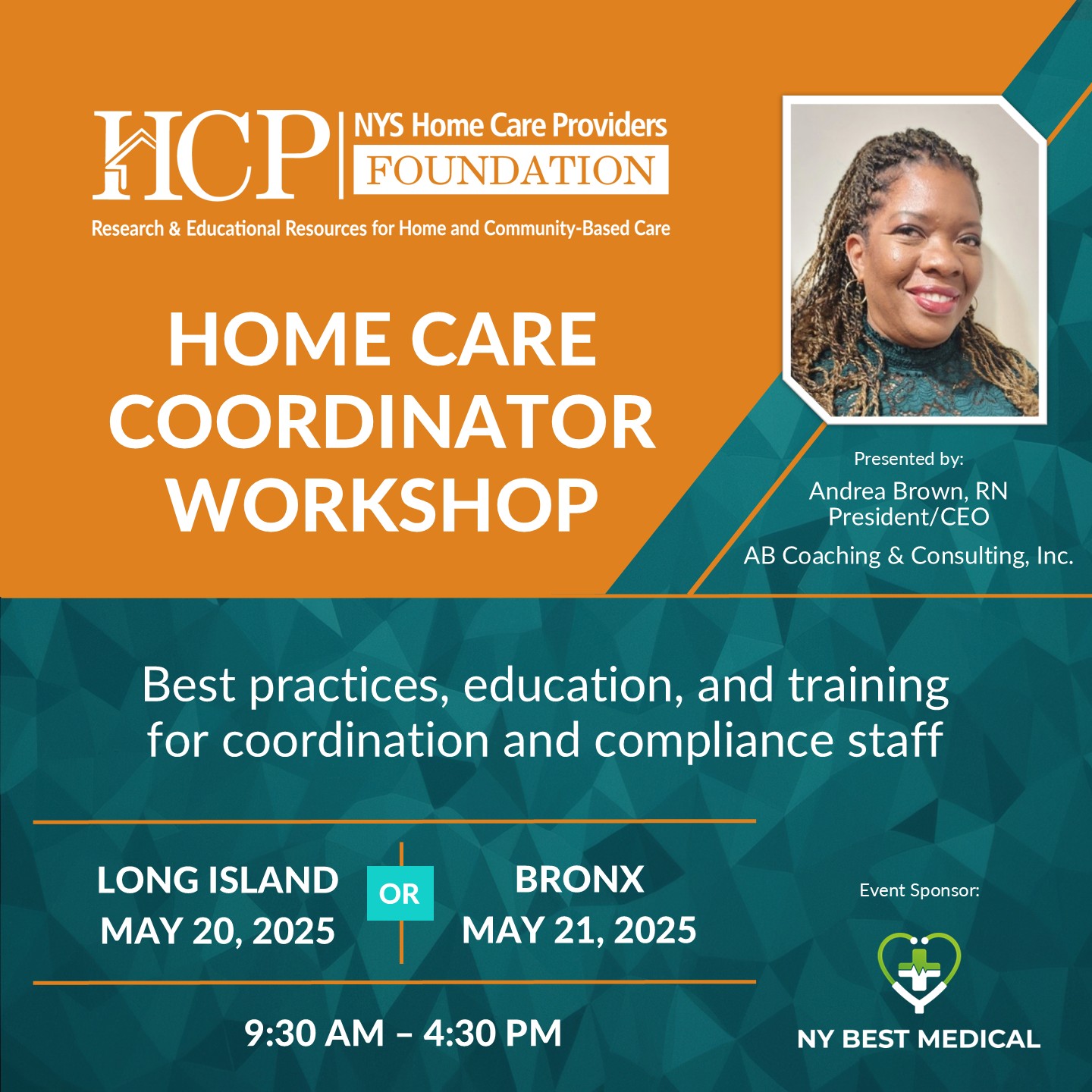Find Home Care
Programs & Services
Home Care Programs and Services
The Centers for Medicare & Medicaid Services (CMS) regulates home care agencies that provide Medicare home health services to Medicare beneficiaries. DOH regulates the home care service programs that are available to certain Medicaid-eligible people under the State’s Medicaid program.
Medicare Home Health Benefit
Skilled care is provided part-time or intermittently to treat the illness or injury of Medicare beneficiaries who are unable to leave their homes without considerable effort or assistance. Skilled care may include nursing and/or therapy and may be accompanied by aide services or social work. Medicare pays for home health benefit services based on a 60-day episode of care.
Private Duty Nursing Services
These services are fee-based skilled nursing care provided to home care recipients, and many patients receiving services through this program are severely disabled children and adults, and AIDS patients. Most Private Duty Nursing patients are technology-dependent (i.e. requiring the assistance of a ventilator) and would otherwise need to be placed in an institutional care setting. Agencies delivering this type of care must receive prior approval from DOH or their local social services district.
Care at Home (CAH) Waiver Program
This is a Medicaid Model Waiver Program that enables physically and developmentally disabled children to be cared for at home at lower costs than institutional care. The CAH waiver enables middle-income families, who would not ordinarily qualify for Medicaid, to obtain nursing care, case management and other support services for their children. This program may also be accessed through the Office for People with Developmental Disabilities (OPWDD).
Traumatic Brain Injury (TBI) Waiver
This Medicaid waiver program is for adults (ages 18 to 64) who have been diagnosed with a TBI and would be eligible for nursing home placement as a direct result of the TBI. Through the provision of a broad service package, this program provides services and supports to enable TBI individuals to successfully remain at home in their communities.
Expanded In-Home Services for the Elderly Program (EISEP)
This program provides non-medical home care, including homemaker/personal care, housekeeper/chore services, respite and other services, such as the removal of architectural barriers. Case management services that help clients and their families assess their needs and develop a plan of care are also an essential part of the program. Increasingly, new technologies such as telemedicine/telemonitoring are becoming more commonplace, and a growing number of technologies are now available for use in the home setting. The New York State Office for the Aging (NYSOFA) regulates EISEP for seniors who do not qualify for Medicaid.
Personal Care Program
The Personal Care Program provides assistance with Activities of Daily Living (ADLs), such as personal hygiene, mobility, toileting, feeding, meal preparation, light housekeeping and laundry for people who require such support services based on a medical need. Clients in this program receive services based on a doctor’s orders and plan of care. The need for services is determined by New York’s Conflict-Free Evaluation and Enrollment Center (CFEEC). Individuals who are deemed eligible for managed care services through CFEEC are educated on their plan options, and once enrolled in a managed care plan, they are able to select a home care agency that contracts with that plan for services. A plan of care is created based on the individual’s physician’s orders, and the managed care plan authorizes the types of services to provide and the number of hours of services.
Certified Home Health Agency (CHHA) Services
CHHA services parallel the part-time, intermittent, post-acute care services that are offered and delivered under the Federal Medicare home health benefit. Medicaid beneficiaries can receive a wide variety of medically necessary services including home health aide, skilled nursing and therapies to assist in their recovery from an illness, surgery or hospitalization.
Consumer Directed Personal Assistance Program (CDPAP)
This program is a Medicaid personal care program for disabled adults and patients with long-term chronic illness who are self-directing. In CDPAP, patients participate in care planning and are responsible for the hiring, training and supervision of workers to provide their care, while home care agencies or other facilities act as a fiscal intermediary (FI) between the worker and the Medicaid program for payment. A managed care plan must conduct an assessment to determine if CDPAP is appropriate for the patient and also authorizes hours of service in much the same manner as the Personal Care Program.
Nursing Home Transition and Diversion (NHTD) Waiver Program
This is a Medicaid waiver program for disabled adults (ages 18 to 64) and adults over 65 who would otherwise be eligible for nursing home placement. Waiver participants may come from a nursing facility or other institution (transition), or choose to participate in the waiver to prevent institutionalization (diversion). The NHTD program offers a broad service package, combining a selection of services from the long term home health care program (LTHHCP), the traumatic brain injury (TBI) waiver, and additional services unique to the NHTD program.
Home Infusion Therapy
This rapidly expanding health care delivery alternative includes chemotherapy, intravenous nutrition therapies, pain management and various drug treatment modalities. Its use is becoming more widespread to shorten inpatient lengths of stay or as an alternative to hospitalization altogether. Eligibility for Home Infusion Therapy is largely dependent upon insurance coverage, and reimbursement practices vary widely with many private insurance plans covering patients on a case-by-case basis.


